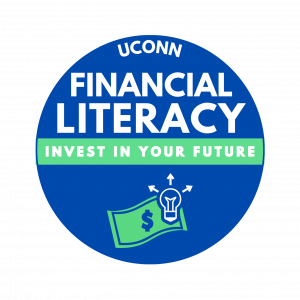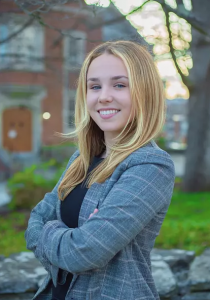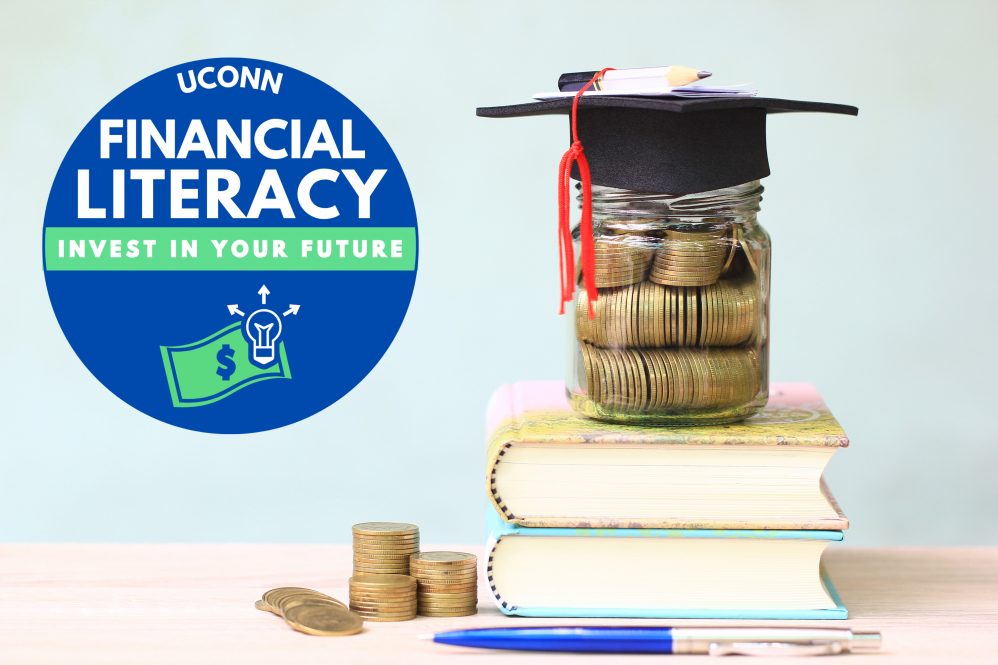Defining the term “financial literacy” might be as difficult as making interest rates, budgeting, and debt management exciting to a group of twentysomethings, but two economics majors are attempting to do both after research from one of them shows many undergraduates don’t understand the basics of managing money.
Nidhi Nair ’23 (CLAS) surveyed 300 UConn students over the last two years to determine the student body’s financial literacy rate and used that data to argue before the state legislature for the need for better lessons in high school.

But the urgency for education among her peers prompted Nair to come up with the idea of hosting a Financial Literacy Week, which with the help of Bridget Abril ’24 (CLAS) will be held April 3-7 to teach UConn students about crucial concepts like credit, financial planning, and investing.
“A lot of undergraduates have multiple streams of income, including money they might get from their parents or other family members, and they don’t know how to deal with that money,” Nair says. “At the same time, they accrue student loan debt and credit card debt without knowing basic concepts. I’m trying to make it clear that they shouldn’t be throwing their money away without having a little financial knowledge.”
Financial literacy, Nair says, is about more than just knowing how to balance a checkbook. That’s an outdated definition of being able to handle money, and part of the reason many parents of Gen Zers haven’t taught them what they need to know. Online banking didn’t exist until 1996, which means checking online bank account balances, for instance, is still relatively new.
“The way our parents think of financial literacy is so different from our reality, and it’s very important for us to understand that. Investing in online stock exchanges is something our parents didn’t do when they were our age. Also, student debt has climbed so much,” Nair says.
“Everything is online,” Abril adds. “Everything is virtual.”
Subscription-based services for things from entertainment to educational have become near-necessities today – and they all cost money. Also, they note, an increasing number of students are investing in the stock market because of the ease provided through apps and other online services, and sometimes students can’t even define what a “stock” is.

One question on Nair’s survey asked how much money would be in a savings account with a $100 starting balance growing at an interest rate of 2% a year after five years. Most respondents said they didn’t know.
She also learned that first-generation students most lacked financial knowledge: “If none of your parents have gone to college, they may be economically unstable themselves,” she says.
Regardless of familial or educational background, financial instruction is essential.
“It’s important for all students, even those who aren’t interested in economics, finance, or business, to start to understand what the next steps for them are when they graduate UConn and when they’re on their own,” Abril says. “That’s what’s important to me about this project.”
Nair brought in Abril last year to manage the marketing of Financial Literacy Week, which includes handling its Instagram account and developing promotions, essentially figuring out a way to make finance fun, something worth a person’s time investment.
“Creating a logo for our Financial Literacy Week was difficult,” Abril says, “because it’s money and it’s finance and it’s stuff that doesn’t really excite people. We had to find something that would catch people’s attention and relate to what we’re doing and not just be something that looks trendy or cute.”
They expect the week to include interactive booths in the Student Union on several of the days and hour-long lectures the other two days. Prize giveaways will be part of the event that will approach the concept of financial literacy from three angles – as Nair also is majoring in mathematics and statistics and Abril brings a second major in political science.
Through a political lens: The two are seeking to advance legislation through the Undergraduate Student Government for a mandatory 20-minute module on financial literacy for incoming students, similar to the drug and alcohol education they now receive.
With a business bent: They’re collaborating with the Werth Institute for Entrepreneurship and Innovation to solicit interesting business ideas that center on financial literacy or ventures that are ongoing now but in need of support.

Centered on research: The endeavor comes thanks to a UConn Co-op Legacy Fellowship Program Change Grant the two received last year upon the conclusion of Nair’s research, lessons from which she drew on in her successful application as a Schwarzman Scholar, the first from UConn.
While the results of Nair’s survey may have indicated a dearth of financial knowledge among students, there was one upside and that might predict a successful outcome for the event, which coincides with National Financial Literacy Month in April.
“In the surveys, one of the questions was would you be interested in learning more about this on campus and around 90% of people who took the survey said yes,” Nair says. “So, they are interested in gaining access to more resources.”
And that’s important to Nair and Abril, because – actually – financial literacy might be fairly simple.
“By financially literate, I mean having the wherewithal to make do with the financial resources you have in your possession,” Nair says. “Honestly, the definition of financial literacy is very vague. People haven’t come to a consensus about it yet because it encompasses so many diverse things. But mainly, it means having the ability to have financial wellness in your life, to have money in case of an emergency or in case something goes wrong.”
Those who would like to help Nair and Abril with Financial Literacy Week, should email them at nidhi_jayakumar.nair@uconn.edu or bridget.abril@uconn.edu, or sign up online to get involved.



